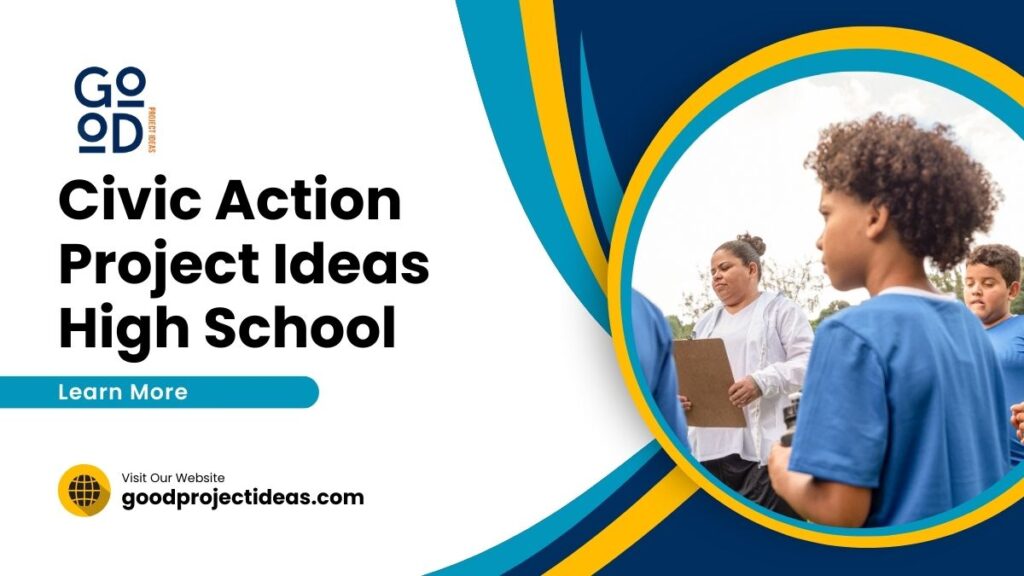Hey, high school pals! Welcome to the Civic Action Project Ideas for High School – where your ideas spark awesome projects!
Alright, let’s keep it chill: you’ve got dreams, right? Big ones! Well, guess what? This is where those dreams become real. Whether it’s sprucing up your neighborhood, helping out at a local spot, or spreading joy around, we’re here to make it happen.
So, get ready to jump into some seriously cool projects. Let’s make some magic, friends!
Civic Action Project Ideas High School
Have a close look at some of the best civic action project ideas high school:-
Environmental Actions
- Clean up a local park.
- Start a recycling program at school.
- Plant trees in your neighborhood.
- Create a garden for bees and butterflies.
- Teach others about composting.
- Say no to single-use plastics.
- Pick up trash on the beach.
- Save water by fixing leaks.
- Talk about climate change.
- Help clean a river or lake.
Social Justice Initiatives
- Raise money for a charity.
- Support LGBTQ+ rights.
- Help people find affordable housing.
- Stand up against racism.
- Talk about gender equality.
- Volunteer at a food bank.
- Learn about immigration rights.
- Mentor younger kids.
- Support people with disabilities.
- Join a protest for fairness.
Educational Endeavors
- Tutor students who need help.
- Talk to professionals about their jobs.
- Give scholarships to deserving students.
- Help with mental health resources.
- Learn about managing money.
- Try coding with friends.
- Start a group to support each other.
- Have fun with science and tech.
- Push for more arts in schools.
- Share books with others.
Health and Wellness Projects
- Start a fitness challenge at school.
- Talk about healthy eating.
- Support mental health awareness.
- Donate blood at a drive.
- Help people fight addiction.
- Say no to drugs and alcohol.
- Learn to relax when stressed.
- Practice mindfulness together.
- Know how to help in an emergency.
- Ask for better healthcare for all.
Community Improvement Efforts
- Fix up a playground.
- Watch out for each other in the neighborhood.
- Share good news in a newsletter.
- Paint a cool mural in town.
- Have fun at a block party.
- Ask for better buses and trains.
- Sell cool stuff at a flea market.
- Share tools with neighbors.
- Create a place to help everyone.
- Have a big sale for good causes.
Civic Engagement Activities
- Get people registered to vote.
- Ask politicians tough questions.
- Write letters to leaders.
- Get teens involved in voting.
- March for what’s right.
- Sign petitions for change.
- Help out on Election Day.
- Learn how our government works.
- Fix money problems in politics.
- Vote in a school election.
Technology and Innovation Projects
- Make a website for the community.
- Build an app for volunteers.
- Try coding for fun.
- Ask for more tech at school.
- Play with robots together.
- Map out cool places to visit.
- Create new ideas with friends.
- Share stories online about good stuff.
- Make a podcast to talk about what matters.
- Explore cool places in VR.
Arts and Culture Initiatives
- Show off your art in a gallery.
- Paint a mural on a big wall.
- Sing, dance, or act in a show.
- Watch films about real life.
- Share food and stories from different cultures.
- Ask for more art in schools.
- Learn how to make cool stuff.
- Tell stories about important things.
- Write poems to express yourself.
- Sing songs to bring joy.
Entrepreneurial Ventures
- Start a business with friends.
- Learn how to be your own boss.
- Ask for help for small businesses.
- Share your big ideas in a competition.
- Sell stuff made by talented people.
- Grow food to sell and share.
- Learn how to manage money well.
- Get help for new businesses.
- Find someone to learn from.
- Support local businesses.
Sports and Recreation Initiatives
- Have fun playing games together.
- Ask for more places to play.
- Start a sports team for fun.
- Teach little kids how to play sports.
- Get moving and have fun together.
- Share sports gear with others.
- Include everyone in sports.
- Explore new places and solve puzzles.
- Run and walk for a good cause.
- Play together and have a blast.
Food Security and Hunger Relief Efforts
- Grow food for everyone to share.
- Give food to people who need it.
- Ask for more food for everyone.
- Help people who can’t buy food.
- Learn how to cook good food for less.
- Collect recipes from around the world.
- Serve food to people who are hungry.
- Use up food instead of throwing it away.
- Eat together and share food.
- Pick food that’s still good to eat.
Disaster Preparedness and Response Projects
- Be ready in case something happens.
- Get stuff to help if things go wrong.
- Build things to stay safe from bad stuff.
- Learn how to help if someone’s hurt.
- Be ready to help if something happens.
- Raise money to help people after bad stuff.
- Ask leaders to do more to stop bad stuff.
- Clean up places that can cause problems.
- Make a plan to get away if we need to.
- Practice what to do if bad stuff happens.
Animal Welfare Initiatives
- Take care of pets that need homes.
- Ask for better rules to keep animals safe.
- Find good homes for animals in need.
- Share food for pets whose families need help.
- Help animals who live outside.
- Ask for rules to keep pets safe in public.
- Make sure pets get fixed so they can’t have babies.
- Learn how to take care of animals.
- Share stories about animals that need help.
- Keep places clean for animals to live.
Immigration and Refugee Support Activities
- Be friends with people who come from different places.
- Ask for rules that treat everyone fairly.
- Share cool things about where we all come from.
- Teach new people how to feel welcome.
- Help new friends do well in school.
- Ask for rules that help everyone feel safe.
- Share what you have to help people who had to leave home.
- Welcome new people to our neighborhood.
- Talk about how we can help people who need it.
- Help new friends learn our language.
Homelessness and Poverty Alleviation Initiatives
- Share food and shelter with people who need it.
- Ask for places where everyone can live.
- Give warm clothes to people who need them.
- Get money to help people have a better life.
- Serve food to people who don’t have any.
- Fix things that make people have no place to live.
- Help people find good jobs.
- Make care packages for people who need help.
- Talk about how to make life better for everyone.
- Do things to help everyone get what they need.
Elderly Care and Support Projects
- Visit people who could use a friend.
- Ask for good places for older people to live.
- Spend time with people who need it.
- Teach older people how to use new stuff.
- Help older people with things they need.
- Ask for better ways for older people to get around.
- Have fun events for older people to enjoy.
- Share things that can make life easier.
- Talk about things that matter to older people.
- Do stuff with older people to have fun.
Mental Health Awareness and Support Campaigns
- Talk about feeling good and feeling bad.
- Ask for more ways to help people feel better.
- Share tips for feeling calm and happy.
- Learn how to help someone who needs it.
- Be there for friends who need a hand.
- Speak up when people say mean things.
- Get money to help people feel better.
- Try different ways to relax and feel good.
- Make cool things to show how we feel.
- Share stories to help people feel better.
LGBTQ+ Rights and Inclusion Initiatives
- Stand up for friends who are different.
- Ask for rules that treat everyone fairly.
- Share cool things about people who are different.
- Teach friends why being different is okay.
- Be a friend to everyone, no matter what.
- Ask for rules that help everyone feel safe.
- Get money to help people who need it.
- Share stories about cool people who are different.
- Learn how to be a good friend to everyone.
- Help friends who are different feel good about themselves.
Disability Rights and Accessibility Projects
- Make sure everyone can join in and have fun.
- Ask for rules that make life fair for everyone.
- Share cool stuff that makes life better for everyone.
- Teach everyone why being different is cool.
- Help friends who need it feel good at school.
- Ask for help when you see things that aren’t fair.
- Share ways to help people who need it feel better.
- Talk about how we can make things better for everyone.
- Ask for ways to help everyone join in.
- Do things to help everyone feel good about themselves.
Civic Education and Youth Leadership Programs
- Get people excited about doing good stuff.
- Ask for cool things to learn about that help our community.
- Share tips for being a good leader.
- Be a part of making decisions that help our community.
- Teach younger kids about how to make things better.
- Ask for rules that help kids have a say in what happens.
- Share what you think to help make our community better.
- Have fun learning about how our community works.
- Get people excited about voting and being a part of making decisions.
- Share what’s important to you and what you want to see change.
What should I do for a civic action project?
When choosing a civic project:
- Find Interests: What community topics do you like?
- Consider Resources: How much time and support do you have?
- Research Ideas: Look into specific issues and solutions.
Project ideas
- Environment: Clean-ups, composting, or planting.
- Education: Mentoring, literacy programs, or skill workshops.
- Health: Health fairs, food drives, or mental health awareness.
- Social Justice: Voter drives, policy advocacy, or volunteering.
Start small and make a difference!
What are some examples of civic activities?
Get Involved in Your Community:
Voting and Politics
- Register and vote.
- Attend local meetings.
- Contact officials.
Volunteering
- Help at kitchens, shelters, or gardens.
- Tutor or mentor.
- Assist seniors.
Advocacy and Activism
- Join marches or protests.
- Sign petitions.
- Boycott or fundraise.
Education and Awareness
- Host workshops or events.
- Write for local papers.
- Share info online.
- Join discussion groups.
Direct Support
- Donate blood or volunteer.
- Collect donations.
- Clean up the environment.
- Help those in need.
Financial Support
- Donate to charities.
- Support local businesses.
- Participate in fundraisers.
What are some civic topics?
Check out some civic topics:-
Government and Democracy
- Understanding Citizen roles and government structures.
- Exploring Voting processes and rights.
- Recognizing the Media’s role in democracy.
- Appreciating Civic engagement importance.
Public Policy
- Advocating for Education and healthcare reforms.
- Supporting Environmental protection.
- Addressing Economic development and inequality.
- Promoting Gun control and safety.
Community Issues
- Working on Crime prevention and policing.
- Supporting Affordable housing and homelessness solutions.
- Contributing to Infrastructure development.
- Maintaining Environmental quality.
Individual Rights and Responsibilities
- Exercising Freedom of speech and privacy.
- Understanding Legal rights and duties.
- Developing Media literacy and critical thinking.
- Embracing Respect for diversity and social responsibility.
Conclusion
In summary, high school civic action projects are a great way for students to make a real impact while learning about community issues. These projects teach responsibility and citizenship, showing students how they can contribute positively to society. By getting involved in such initiatives, students not only help their communities but also develop a lasting sense of civic duty.



